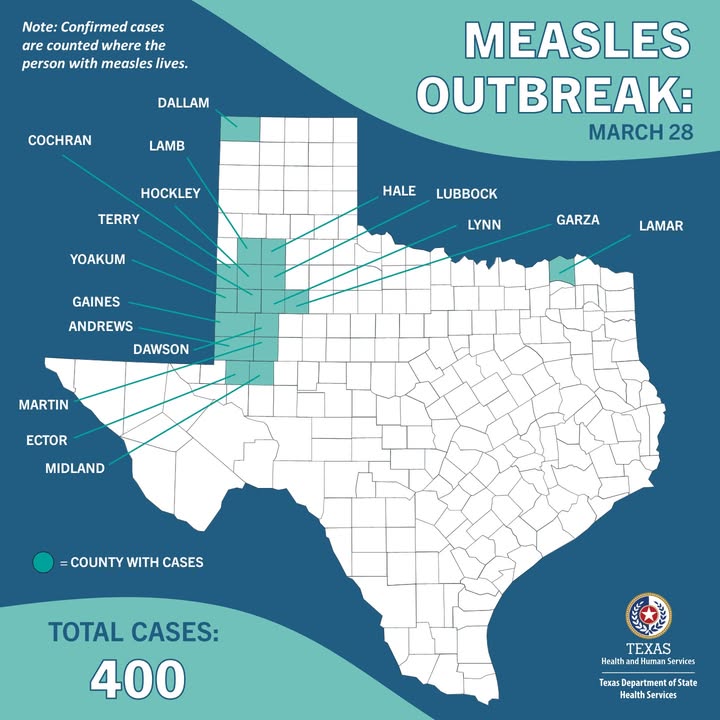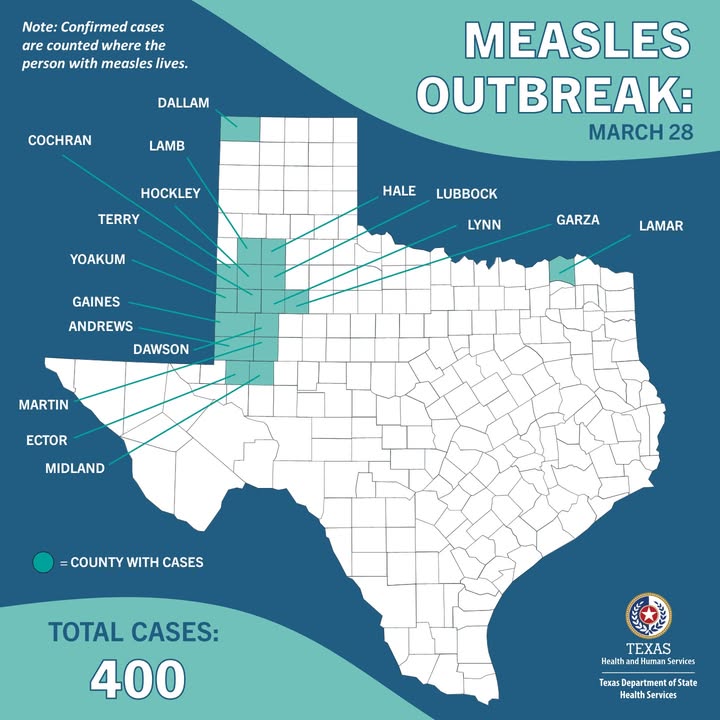Massive Measles Outbreak: 400 Cases Ignites Public Health Crisis!
Measles Outbreak in Texas: Key Information and Prevention Strategies
The Texas Department of State Health Services (DSHS) has been actively monitoring a significant measles outbreak in the South Plains and Panhandle regions. As of March 28, 2025, the DSHS reported a staggering 400 confirmed cases of measles since late January. This outbreak highlights the critical importance of vaccination and public health awareness.
Understanding Measles
Measles is a highly contagious viral infection that can lead to severe health complications, including pneumonia, encephalitis, and even death. The virus spreads through respiratory droplets when an infected person coughs or sneezes. It can remain in the air for up to two hours, making it easy for others to contract the disease.
Symptoms of Measles
The initial symptoms of measles typically appear 10 to 14 days after exposure and may include:
- High fever
- Cough
- Runny nose
- Red, watery eyes
- A rash that usually starts at the head and spreads downward
Recognizing these symptoms promptly and seeking medical attention is crucial for controlling the spread of the virus.
- YOU MAY ALSO LIKE TO WATCH THIS TRENDING STORY ON YOUTUBE. Waverly Hills Hospital's Horror Story: The Most Haunted Room 502
Importance of Vaccination
The DSHS emphasizes that immunization is the most effective way to prevent measles. The measles, mumps, and rubella (MMR) vaccine is recommended in two doses:
- The first dose is usually administered between 12 and 15 months of age.
- The second dose is given between 4 and 6 years of age.
Vaccination not only protects individuals from getting sick but also helps to prevent outbreaks in the community. High vaccination rates are essential to achieve herd immunity, which protects those who cannot be vaccinated due to medical reasons.
Current Situation in Texas
The ongoing measles outbreak in Texas serves as a wake-up call regarding the importance of vaccination. With 400 cases reported, it is crucial for residents to understand the gravity of the situation. The DSHS is actively working to control the outbreak, which includes efforts to increase vaccination rates and educate the public about the risks associated with measles.
How to Protect Yourself and Others
To safeguard yourself and the community from measles, follow these recommendations:
- Get Vaccinated: Ensure that you and your family are up to date with the MMR vaccine. Check with your healthcare provider if you are unsure about your vaccination status.
- Educate Yourself: Stay informed about the symptoms and transmission of measles. Understanding how the virus spreads can help you take necessary precautions.
- Avoid Close Contact: If you or someone in your household shows symptoms of measles, avoid close contact with others, especially those who are unvaccinated.
- Practice Good Hygiene: Wash your hands frequently and cover your mouth and nose when coughing or sneezing. This helps reduce the risk of spreading infections.
- Stay Informed: Follow updates from trusted health organizations like the DSHS, and heed any recommendations or warnings.
The Role of Community Immunity
Community immunity, or herd immunity, occurs when a significant portion of the population is vaccinated against a disease, reducing its spread. This is particularly important for protecting vulnerable individuals, such as infants who are too young to be vaccinated and individuals with compromised immune systems.
To maintain high levels of community immunity, it is essential for the public to understand the importance of vaccines. Education campaigns and outreach programs can help dispel myths and misinformation surrounding vaccinations, ensuring that more individuals choose to get vaccinated.
Conclusion
The measles outbreak in the South Plains and Panhandle of Texas underscores the importance of vaccination and public health awareness. With 400 confirmed cases reported, it is crucial for residents to take preventive measures seriously. The MMR vaccine is a safe and effective way to protect yourself and your community from measles.
By getting vaccinated and staying informed, individuals can contribute to controlling the outbreak and preventing future cases. Remember, vaccination not only protects you but also plays a vital role in safeguarding the health of the entire community.
For more information on measles and vaccination guidelines, visit the Texas DSHS website or consult your healthcare provider. Together, we can work towards eliminating measles and ensuring a healthier future for all.

1/ DSHS continues to track the measles outbreak in the South Plains and Panhandle.
As of today, 400 cases have been identified since late January.
Immunization with two doses of MMR vaccine protects you from getting sick and stops the outbreak from spreading. pic.twitter.com/wDh9ka04dV
— Texas DSHS (@TexasDSHS) March 28, 2025
Understanding the Measles Outbreak in South Plains and Panhandle
It seems that the DSHS continues to track the measles outbreak in the South Plains and Panhandle, and the numbers are concerning. As of now, there have been 400 cases identified since late January. This uptick in cases highlights the importance of staying informed about the situation and understanding how we can protect ourselves and our communities. In this article, we will delve into the details of the outbreak, the significance of the MMR vaccine, and what you can do to help.
What’s Happening with the Measles Outbreak?
The Texas Department of State Health Services (DSHS) is on top of tracking the measles outbreak in the South Plains and Panhandle regions. The reported cases have been climbing steadily since late January, with a total of 400 cases identified. This is alarming news, especially considering how contagious the measles virus can be. If you’re wondering how it spreads, it’s primarily through respiratory droplets when an infected person coughs or sneezes. The virus can linger in the air, making it easy for others to catch it.
Why You Should Be Concerned
Measles is more than just a rash; it can lead to severe complications like pneumonia, encephalitis, and even death. It’s not just a childhood illness; adults can get measles too, especially if they are unvaccinated. The current outbreak reflects a broader trend in vaccine hesitancy, which can compromise herd immunity and put everyone at risk. That’s why it’s crucial to stay informed and take proactive measures.
The Importance of Immunization
One of the most effective ways to combat the spread of measles is through immunization. The DSHS emphasizes that immunization with two doses of the MMR vaccine (measles, mumps, and rubella) protects you from getting sick and helps to stop the outbreak from spreading. If you haven’t been vaccinated yet, or if you’re unsure about your vaccination status, now is the time to check with your healthcare provider.
What is the MMR Vaccine?
The MMR vaccine is a safe and effective way to protect against measles, mumps, and rubella. The first dose is usually given to children around 12-15 months, with a second dose administered between ages 4-6. Adults who haven’t been vaccinated or those who are unsure about their vaccination history should also consider getting vaccinated. It’s never too late to take action. For more information on the vaccine, you can visit the CDC’s MMR vaccine page.
How Can You Stay Protected?
Staying protected goes beyond getting vaccinated. It’s also about being aware of your surroundings and the health of those around you. If you notice symptoms such as a high fever, cough, runny nose, or a characteristic rash, seek medical attention immediately. Early detection can help contain the spread of the virus. Moreover, if you know someone who hasn’t been vaccinated, encourage them to get the MMR vaccine. It’s all about community health, and every little effort counts.
Community Awareness and Response
Communities play an essential role in combating outbreaks like this. Awareness campaigns, education, and accessible vaccination clinics can make a massive difference in controlling the spread of the virus. The DSHS is actively working with local health departments to ensure that residents are informed and have access to vaccinations. If you’re part of a community organization or have connections in your local area, consider organizing informational sessions or vaccination drives to spread the word.
What to Do if You Suspect Exposure
If you think you’ve been exposed to someone with measles, it’s crucial to act quickly. The DSHS recommends contacting your healthcare provider for guidance. They may recommend the MMR vaccine if you haven’t been vaccinated and you’re within a specific time frame of exposure. It’s important to remember that measles is highly contagious, so isolating yourself until you can get guidance is a good practice.
The Role of Social Media in Public Health
Social media platforms have become vital in disseminating information quickly, especially during health crises like this measles outbreak. The Texas DSHS Twitter page is a great resource for real-time updates and information regarding the outbreak. Following credible health organizations and staying engaged can help you and your loved ones stay informed and safe.
Dispelling Myths about Vaccination
Despite the overwhelming evidence supporting the safety and efficacy of vaccines, myths and misconceptions persist. Some people worry that the MMR vaccine causes autism or other health issues, but extensive research has disproven these claims. The risk of severe complications from measles far outweighs any potential risks associated with the vaccine. Educating yourself and others about these myths can help combat misinformation.
Conclusion
The ongoing measles outbreak in the South Plains and Panhandle is a reminder of the importance of vaccination and community health. With 400 cases identified since late January, it’s vital to stay informed and take action. Immunization with two doses of the MMR vaccine is your best defense against this highly contagious disease. Let’s work together to protect our communities and ensure that we don’t see further outbreaks in the future. Stay safe, stay informed, and don’t hesitate to reach out for help if you need it.
“`
This article should engage readers and provide essential information about the measles outbreak while remaining SEO-optimized.

